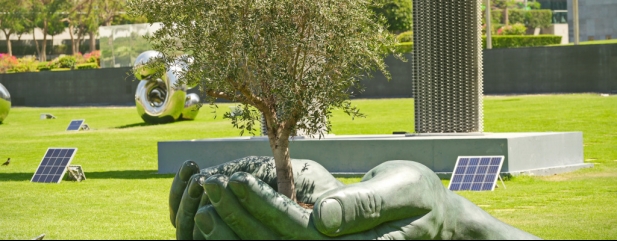Archived article
Please note that tax, investment, pension and ISA rules can change and the information and any views contained in this article may now be inaccurate.
Will the latest global climate conference result in meaningful progress?

To precious little fanfare COP28 is underway. The 28th Conference of the Parties of the United Nations Climate Change Committee, is somewhat controversially being held in Dubai, a city whose fortunes and skyline were built on extracting fossil fuels.
As global temperatures continue to rise – with large parts of Brazil under a red alert as well as record temperatures in South Africa and Madagascar – there is a greater need than ever for countries and corporates to agree on measures to try to reduce greenhouse gas emissions.
Yet if anything the world seems to be moving in the other direction. Far-right anti-environmentalists have dominated elections in the Netherlands and Argentina, with the new Argentinian president calling climate change a ‘socialist lie’ and the leader of the Dutch Freedom Party telling voters they must ‘stop being afraid’ of climate change.
Meanwhile, the Indian government is actually increasing its use of coal-fired electricity generation by adding at least 80 gigawatts of new capacity over the next decade and has said it ‘won’t bow down’ to pressure to take coal phasedown targets at COP28.
So, what if anything can we hope to see come out of this gathering?
For starters, the US and France have said they will back a ban on private financing for new coal-power projects, which should make for an interesting debate, while Germany and Chile plan to launch a ‘climate club’ to help developing nations invest in decarbonizing industries like steel and cement production.
More concretely, COP28 president Sultan Al Jaber, who happens to be chief executive of Dubai’s national oil company, wants to put the focus firmly on energy producers and has said cutting the supply of fossil fuels is ‘inevitable and essential’.
Big energy firms like BP (BP.) and Shell (SHEL) make much of their investment in ‘green’ alternatives, yet according to the IEA (International Energy Association) on average just 2.7% of all oil and gas capital spending is directed at clean energy, and more than 80% of all oil and gas is produced by companies with no plans to clean up their act at all.
To bring the industry into line with a ‘net-zero-by-2050’ scenario, which many governments have pledged themselves to, capital spending on low-carbon alternatives would have to reach an average of 50% so there is a huge gulf between what companies are promising and what they actually need to do.
The issue is, for that gulf to narrow shareholders and governments would have to accept much lower returns, and as the IEA muses, there ‘doesn’t appear to be a large appetite’ to make that a reality.
Important information:
These articles are provided by Shares magazine which is published by AJ Bell Media, a part of AJ Bell. Shares is not written by AJ Bell.
Shares is provided for your general information and use and is not a personal recommendation to invest. It is not intended to be relied upon by you in making or not making any investment decisions. The investments referred to in these articles will not be suitable for all investors. If in doubt please seek appropriate independent financial advice.
Investors acting on the information in these articles do so at their own risk and AJ Bell Media and its staff do not accept liability for losses suffered by investors as a result of their investment decisions.
Issue contents
Editor's View
Feature
Great Ideas
News
- The S&P 500 set to notch-up the biggest monthly gain of the year
- Frontier Development shares hit a nine-year low on sales disappointment
- Rightmove shows resilience in latest trading update despite housing market uncertainty
- Strong growth and a new head of operations drive rerating at Trustpilot
- Will the latest global climate conference result in meaningful progress?

 magazine
magazine








